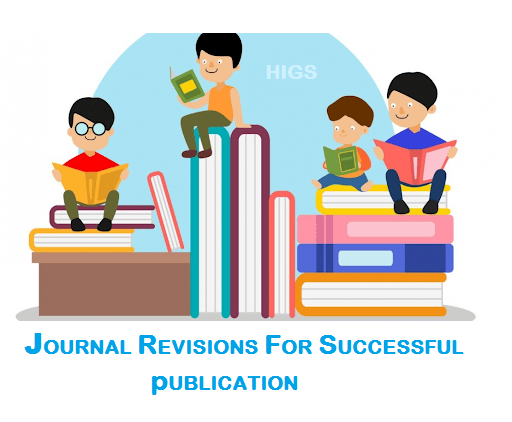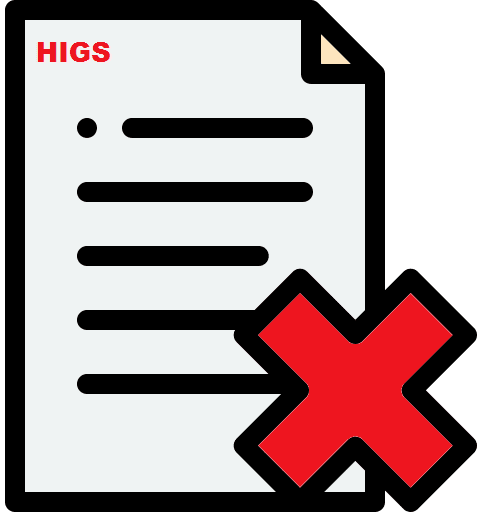JOURNAL REVISION
As the best journal publication service in India, HIGS offers first-rate journal revisions or journal comment correction services for PhD research papers. HIGS provides world-class service in every stage of the PhD research journey. We offer journal revision services to our clients till the research paper/article gets published in the preferred journal. What is the Purpose of Revision And Why is it important? The purpose of revision is to verify the research study whether meets the journal demand and fits the scope. Revision of an article to be published is inevitable since the revision ensures the paper's structure, flow and presentation.
We help researchers to publish papers in journals and we do corrections if any suggested by the journal editors and Peer reviewers and resubmit the papers for publication. Our service aims to provide customer satisfaction. We offer our service till you get 100% satisfaction with our work. Hire us to get the best quality service at an affordable price. The most important stage in the publication process is the journal editorial and peer review. This determines whether the article is fit for publication or not.

What is a Peer review process?
Any article submitted for the publication process in any journal will be analyzed by the journal experts to determine whether the article meets the scope of the journal and is suitable for publishing. This process is called Peer review.
Salient Features of HIGS
- Experienced Writers
- Subject Specialists
- Guaranteed unique content
- High-Quality Documents
- Guaranteed Publications
- Confidentiality
- Quick Response
- Reasonable Prices
- Promised On-time Delivery
- 24/7 Customer Service
Peer Review in Journal Publishing
Benefits of Peer review in writing: It is the process through which the journals evaluate the quality of the research study by inviting experts in the field to review the manuscript and help determine whether it is suitable for publication. The process usually involves the following steps such as editor screening and peer review.
The Outcome of the Peer-review process is as follows, according to the quality of the article.
Accept
This means that the article can be published in the present form. It is extremely rare for a paper to be accepted in the first submission.
Major Revision
Major revision implies that substantial changes have to be made to the document such as adding or removing additional content, changing format etc. After finishing corrections the document should resubmit to the reviewers.
Minor Revision
A minor revision implies that there are a limited number of changes needed to improve the document. After corrections are made the article can directly be submitted for publication.
Rejection
This denotes that the article doesn't fit the scope of the journal. In this case, one may need to change the topic or need to rewrite the research paper.
Why Choose HIGS?
workspace_premium Expertise in Diverse Fields
HIGS has a team of highly qualified and experienced experts across various academic disciplines. Whether your research falls within science, technology, medicine, or humanities, HIGS has specialists with the knowledge to provide insightful and accurate feedback.
library_books Tailored Revision Services
Recognizing that each manuscript is unique, we provide customised revision services. The expert team considers the specific requirements of your target journal, ensuring that your manuscript not only meets but exceeds the expectations of the editorial board.
overview Fast and Efficient Turnaround
Time is often of the essence in the world of academic publishing. HIGS understands the importance of timely revisions. With a commitment to efficiency, the platform ensures a prompt turnaround without compromising the quality of the feedback provided.
contact_mail In-Depth Feedback
Our team goes beyond simple proofreading and grammar checks. The experts offer detailed and constructive feedback on various aspects of your manuscript, including structure, clarity, methodology, and overall coherence. This comprehensive approach significantly enhances the chances of acceptance.
post_add Quality Assurance
Our services are always focused on quality. Rigorous quality assurance processes are in place to ensure that the revisions meet the highest standards. This commitment to quality sets HIGS apart in the competitive landscape of journal revision services.
handshake Transparent Communication
Communication is key in any collaborative effort. We maintain transparent and open lines of communication throughout the revision process. Authors can interact with the experts, seek clarification, and discuss any concerns, fostering a collaborative environment.
At HIGS, we take pride in providing extensive support and expert guidance for a wide range of journal revisions. Whether you're dealing with substantial revisions demanding thorough content and methodology adjustments or minor edits focused on enhancing clarity and language, our dedicated team is here to assist you throughout the entire process. Our team comprises experienced researchers, editors and subject-matter specialists, ensuring we are well-equipped to address diverse revision needs.
We recognize that journal revision encompasses a range of adjustments, including structural modifications, content enhancements, and refinements in language and formatting. With HIGS, you can trust that your work will seamlessly align with the specific guidelines of your target journal, significantly improving the likelihood of acceptance and elevating your research in the competitive academic arena. Our tailored and meticulous approach ensures that your manuscript not only meets the necessary criteria but also stands out, effectively communicating your findings to the scholarly community. Whatever the nature of your revision needs, HIGS is your dedicated partner on the path to a successful research publication.
Work Flow
At HIGS, our efficient workflow incorporates proper communication and feedback from clients, to meet their expectations. Here our workflow is given in steps.
step: 1
Initial Assessment
Our team conducts an initial assessment to understand the scope and requirements of the revision.
step: 2
Assignment to Expert
A subject-matter expert is assigned based on the manuscript's subject area and specific needs.
step: 3
Comprehensive Review
The expert conducts a detailed review of the manuscript, considering content, structure, methodology, language, and adherence to guidelines.
step: 4
Revision Implementation
The expert implements revisions, addressing structural, content, and language aspects as needed.
step: 5
Quality Assurance
A thorough check ensures accurate implementation of revisions and alignment with journal guidelines.
step: 6
Peer Review Assistance
Assistance is provided in addressing peer review comments strategically to improve manuscript quality.
step: 7
Final Review and Approval
The revised manuscript undergoes a final review for approval, to ensure that the research paper is ready for journal submission.
step: 8
Journal Submission
We submit the revised document that is ready for submission to the targeted journal.
Why Does the paper Get Rejected?
Reasons for the rejection of papers by journals,
- The paper may be out of scope

- The subject may not suit the journal

- Poor methodology

- Poor references

- Poor language

- Poor scientific content

- Incomplete Data

- Conformed Plagiarism

- Too basic research

- Similar paper existence

- Weak Hypothesis

- Lack of proper documentation

What Do We Do In Journal Revision?
- HIGS ensures that your article shall not get rejected for language errors such as grammatical errors, spelling errors, etc.
- We provide major revisions and minor revisions for the research papers/ articles and also ensure journal formatting to get them published in the journal.
- We impart expert reviews and unlimited revisions for the papers in the major revision category and provide substantial changes to the content suggested by the journal experts and make it eligible for journal publishing.
- Our editors do repeated revisions in the rejected paper/article to make suitable changes and corrections and resubmit it. Therefore the chance for publication in a reputed journal is increased.
- We resubmit the revised paper to the Journal, by making suitable corrections until it gets published in the preferred journal.
- Our experienced and qualified team of experts ensures that you receive the article/research paper free from errors and increases your credibility.
- Even a small mistake will spoil the chance of publishing papers. So we are aware of rectifying all the errors to create an excellent document suitable for journal publication.

1. Manuscript formatting
In your research presentation, formatting is crucial. HIGS not only focuses on content but also pays meticulous attention to manuscript formatting. Our experts ensure that your document adheres to the specific guidelines of your target journal, presenting your research in a visually appealing and professional manner that enhances readability and comprehension.
2. Comprehensive Language Enhancement
Language clarity is crucial for effective communication in academic writing. HIGS goes beyond basic language edits, offering comprehensive language enhancement services. Our experts refine your manuscript to ensure clarity, coherence, and precision in language, making your research not only academically sound but also accessible to a broader audience.
3. Efficient Peer Review Assistance
The peer review process can be challenging, often requiring strategic responses to reviewer comments. At HIGS, we offer efficient peer review assistance to help you address reviewers' comments effectively. Our team provides strategic insights and revisions, ensuring that your responses to reviewers contribute to the overall improvement of your manuscript.
4. Rapid Turnaround Time
Publishing academically is a time-consuming process. At HIGS, we prioritize efficiency without compromising on quality. Our streamlined processes and dedicated team allow for a rapid turnaround time, ensuring that you receive timely feedback and revisions. This quick response is particularly valuable in meeting tight submission deadlines and accelerating your journey towards publication.
Journal Revision and Submission In Reputed Journals
Throughout our service history, we have consistently excelled in revising and correcting research papers based on valuable input from journal editors and reviewers. Our publications span a diverse array of high-ranking journals, such as
- IEEE
- TAYLOR AND FRANCIS
- WEB OF SCIENCE
- ACM DIGITAL LIBRARY
- Q1, Q2, Q3, Q4 JOURNALS
- ANNA UNIVERSITY ANNEXURE
- UGC JOURNALS
- WILEY PUBLICATION
- INDER SCIENCE
- AND MORE.
Customizing Revisions to Journal Standards
At HIGS, our approach to journal revision is characterized by a meticulous process that goes beyond generic corrections. We understand the unique demands of various journals and employ a tailored strategy for each manuscript. Whether it's aligning with the stringent guidelines of SCI-indexed journals or adapting to the specific formatting requirements of IEEE paper publications, our expert team ensures your manuscript is not just revised but perfectly aligned with the expectations of your target journal.
Refining Your Manuscript to Maximize Research Impact
We pay close attention to the rules and requirements of different academic journals. Our team works diligently to revise your paper, aligning it precisely with the specific rules of your target journal. This ensures a smooth and straightforward manuscript submission process, meeting the expectations of the chosen publication. Our dedication to attention to detail and accuracy in adhering to journal guidelines enhances the overall impact of your research. We carefully edit your paper to match exactly what your target journal requires, making the submission process easy.
You Can Reach Us Anytime For Any Queries. We Are Not Only Here For Journal Revision, We Are Also Here For Handling Your Entire Research Work. We Meet Your 100% Satisfaction Level .You Can Contact us Anytime Through Call At +916382814563, You Can Send Mail At researchguidance@higssoftware.com , You Can Hire Us Through Whatsapp At +918681018401. Our Clients Also Visit,
FAQ
1. What types of documents do you revise under your journal revision service?
We provide revision services for various academic documents, including research articles, review papers, conference papers, and more.
2. How experienced are your editors in handling revisions for different research fields?
Our team of editors comprises experts from diverse academic backgrounds, ensuring that we have the expertise to handle revisions in a wide range of research fields.
What is the turnaround time for the journal revision service at HIGS?
Turnaround times may vary depending on the length and complexity of the manuscript. However, we strive to provide prompt and efficient services. You can discuss your specific timeline requirements with our team.
4. Can I choose specific areas for revision, or is it a comprehensive review of the entire manuscript?
We offer customisable services, allowing clients to specify particular areas they want to focus on. However, our standard service typically involves a comprehensive review of the entire manuscript.
5. How do you ensure the confidentiality and security of my research work during the revision process?
At HIGS, we prioritise the confidentiality and security of your research. Our editors sign confidentiality agreements, and we have robust systems in place to safeguard your intellectual property.

